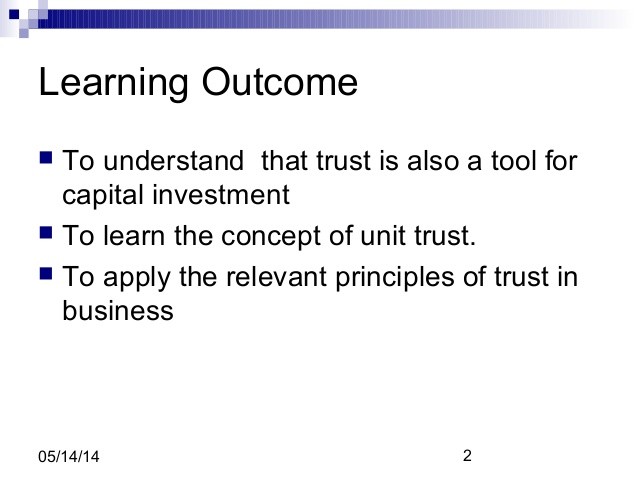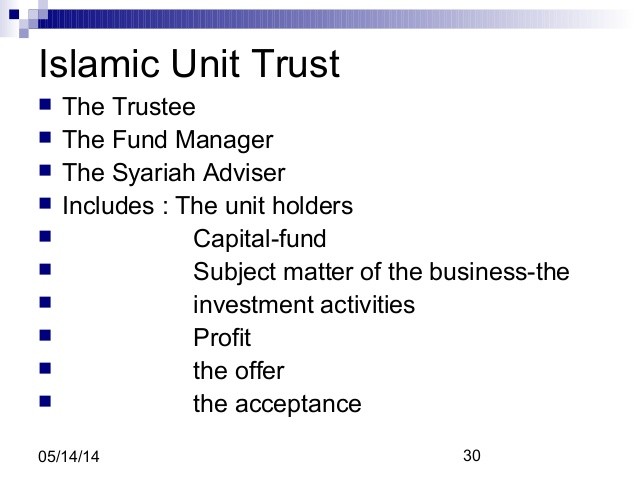Investing in unit trusts Business
Post on: 14 Июнь, 2015 No Comment

Investing in unit trusts
INVEST in a variety of instruments with help from financial experts when you buy into unit trusts.
Much like mutual funds, unit trusts allow investors of all types to put their savings in a common fund, which is invested in a variety of instruments that may not normally be available to access as individuals.
The main difference between the two is their legal structure. Unit trusts are managed by investment companies that issue units. Mutual funds, on the other hand, are investment companies that issue shares and pay dividends.
Unit trusts are excellent vehicles in times of uncertainty, said Sean Taylor, senior research analyst at Barita Investments.
The investments are divided in units, so when an individual makes an investment, they are in fact buying units of that particular price, he said.
Minimum investment amounts will vary based on the fund and/or the fund manager, but in most instances the minimum is between $15,000 to $50,000, said Brian Frazer, vice- president, Asset Management, Scotia Asset Management.
At Sagicor Life Jamaica, the minimum to invest in nine of its fund options is only $500 and $500 million for Sigma Real Estate, said Christina Ford, investment advisor at the company.
Fundamentally, unit trust funds give small investors the combined benefits of diversification, security and a sufficient weight of assets to ensure cost-effectiveness.
If you are like most who do not have time to manage your money, it will serve your investment well to be in the hands of someone who has the time, skill and expertise to make that money work for you, Taylor said.
A professional manager who buys a portfolio of securities, which may include money market instruments, fixed income securities, equities, real estate or other classes of assets, manages the fund, said Frazer.
Trustees also oversee the managers.
The Financial Services Commission regulates unit trusts and the assets are held in ‘trust’ in the name of the fund’s trustee on behalf of the unit holders completely separate from the assets of the fund manager, he said.
The trustee protects the interests of the investors by ensuring that the management company complies with the provisions of the trust deed governing investments and the Unit Trust Act, Ford said.
There are many different types of unit trust funds available and it is important that you match your needs, objective and risk profile with the fund you plan to invest in, Ford said.
The typical types of unit trusts are money market, fixed income, equity, real estate or balanced funds, which would include significant exposure to more than one asset class.
If you are looking to invest in short-term cash, and cash-equivalent securities, a money market unit trust is ideal for you.
It provides liquidity and preservation of capital; it is low risk, so returns will correspond with returns on cash and cash-equivalent securities, Frazer said.
There’s the option of investing in fixed income unit trusts, where you can buy into a diversified mix of short-to medium-term fixed income instruments.
With these, the investor can get exposure to income asset classes with a potential for higher returns than money market instruments, Frazer said. Capital invested may be subject to some movement due to changes in interest rates.
And, if you fancy buying into a company, you can buy into an equity unit trust. This is primarily an investment in stocks and shares of companies with the potential to earn significant real, returns.
Of note is you wont receive dividends, though investment has been made in stocks. Instead, the money that is paid out from stocks is paid to the fund.
This helps with the valuation of the fund, Taylor said. As an investor you capitalise on it by selling the units.

There’s potential for growth and capital appreciation over the medium to long term with this investment, Frazer said.
You can even invest in a real estate fund.
The real estate investment trusts (REITs) or joint ventures can help you realise capital appreciation, depending on market conditions.
Balanced funds, which are invested in a combination of equities, bonds, cash and cash-equivalent securities, provide both income and capital appreciation while avoiding excessive risk.
All investors, whether small or large, earn the same rate of return and may buy into the fund or sell their units at any time, the Scotia Asset Management vice- president said.
Unit Trusts provide tax-free benefits to investors, as the returns on equity-based funds are tax-free. While investors in fixed income can earn some tax-free benefits if their investments remain in the fund for a minimum period of five years.
Frazer reckons the setbacks of investing in a unit trust are that the investor is not able to directly control the asset manager.
But because of economies of scale the unit trust manager can take advantage of investment opportunities and negotiate better investment rates than a small investor, Frazer said.
Once unit holders meet the unit trust minimum holding period they will have easy access to their funds when they need it compared to direct investments in bonds and equities, he added.
Information is provided in the Business Observer about the buying and selling price of the units. It also shows the 12 months and the year-to-date performance of the unit trusts as well as the estimated yields for the funds.
You can invest in more than one unit trust, this offers different asset classes and diversification helps to reduce the overall risk in your portfolio.
Let’s face it none of us can predict the future and the only sure way of reducing the risks in any portfolio is through diversification.














